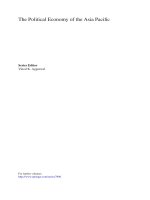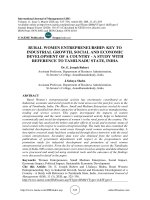Economic growth and economic development 588
Bạn đang xem bản rút gọn của tài liệu. Xem và tải ngay bản đầy đủ của tài liệu tại đây (111.39 KB, 1 trang )
Introduction to Modern Economic Growth
a price of χ(ν, t) at time t to maximize profits. Since machines depreciate after use,
χ(ν, t) can be interpreted as a “rental price” as well.
The demand for machine of type ν is obtained by maximizing net aggregate
profits of the final good sector as given by (13.2) minus the cost of inputs. Since
machines depreciate after use and labor is hired on the spot market for its flow services, the maximization problem on the final good sector can be considered for each
point in time separately, and simply requires the maximization of the instantaneous
profits of a representative final good producer. These instantaneous profits can be
obtained by subtracting the total inputs costs, the user costs of renting machines
and labor costs, from the value of our production. Since machines depreciate fully
after use, the user cost of renting machine ν at time t is χ (ν, t). Therefore, the
maximization problem at time t is:
(13.5)
1
max
[x(ν,t)]lv∈[0,N (t)] ,L 1 − β
"Z
0
N (t)
1−β
x(ν, t)
#
β
dν L −
Z
N(t)
0
χ (ν , t) x(ν, t)dν − w (t) L.
The first-order condition of this maximization problem with respect to x (ν, t)
for any ν ∈ [0, N (t)] yields the demand for machines from the final good sector.
These demands take the convenient isoelastic form:
(13.6)
x(ν, t) =
L
,
χ(ν, t)1/β
which only depends on the user cost of the machine and labor supply, and not on the
interest rate, r (t), the wage rate, w (t), or the total measure of available machines,
N (t).
Now consider the maximization problem of a monopolist owning the blueprint of
a machine of type ν invented at time t. Since the representative household holds a
balanced portfolio of all the firms in the economy and there is a continuum of firms,
there will be no aggregate uncertainty, so each monopolist’s objective is to maximize
profits. Consequently, this monopolist chooses an investment plan and a sequence
of capital stocks so as to maximize the present discounted value of profits starting
from time t. Recalling that the interest rate at time t is r (t) and the marginal cost
of producing machines (in terms of the final good) is ψ, the net present discounted
574









